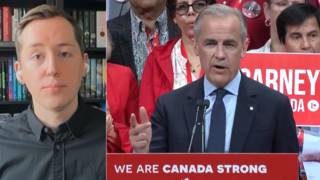
Topics
Guests
- Chad TerhuneSenior writer at BusinessWeek, where he’s covered healthcare for many years, co-author of the article 'The Health Insurers Have Already Won'
In a cover story for BusinessWeek earlier this month, reporters Chad Terhune and Keith Epstein argue UnitedHealth and other insurers maneuvered to shape healthcare reform for their own benefit. The story is titled “The Health Insurers Have Already Won,” and the authors argue that the insurers have “succeeded in redefining the terms of the reform debate to such a degree that no matter what specifics emerge in the voluminous bill Congress may send to President Obama this fall, the insurance industry will emerge more profitable.” We speak with Chad Terhune, senior writer at BusinessWeek, where he’s covered healthcare for several years. [includes rush transcript]
Transcript
ANJALI KAMAT: We begin today with the continuing debate on healthcare reform. The White House indicated this weekend that it might be willing to drop proposals for a public insurance plan to compete with the private sector.
Health and Human Services Secretary Kathleen Sebelius said Sunday on CNN that the public option was, quote, “not the essential element” of comprehensive reform. White House Press Secretary Robert Gibbs also hinted as much when he told CBS’s Face the Nation that the President, quote, “will be satisfied” if they could come up with a plan that provided choice and competition in the insurance market outside of a government plan option.
Their comments came one day after President Obama’s own response at a healthcare forum in Colorado. He said, quote, “the public option, whether we have it or don’t have it, is not the entirety of healthcare reform.”
AMY GOODMAN: As the White House seems to be willing to back off a public option, is considering North Dakota Democratic Senator Kent Conrad’s proposal for a nonprofit health cooperative, we take a look at what’s really shaping the healthcare debate behind the scenes.
In a cover story for BusinessWeek earlier this month, reporters Chad Terhune and Keith Epstein argue UnitedHealth and other insurers maneuvered to shape healthcare reform for their own benefit. The story is called “The Health Insurers Have Already Won.” The authors argue the insurers have, quote, “succeeded in redefining the terms of the reform debate to such a degree that no matter what specifics emerge in the voluminous bill Congress may send to President Obama this fall, the insurance industry will emerge more profitable.”
Well, we’re joined on the phone from Florida by co-author of the piece, Chad Terhune, senior writer at BusinessWeek, where he’s covered healthcare for several years.
Welcome to Democracy Now!, Chad. Explain first why you believe, no matter what option is presented, no matter what the bill is, the health insurers have won.
CHAD TERHUNE: First, thanks for having me on.
I think if you look back earlier in the year, there was a lot of gloom and doom for the insurance industry, a lot of harsh rhetoric from both the President and Congress. But if you look even, you know, by midsummer, you could get a pretty good picture of what was going to come in a final bill. And as you just noticed, we’re kind of getting clear confirmation that there’s not going to be a public plan. And I could have told you that from my reporting earlier in the summer, just was not going to happen.
And I think if you — if you look from an insurance company’s point of view, a public plan was the worst thing they wanted to avoid. They do not want to compete against the government, so they can check that off. And then, two, things like the minimum benefits, what coverage will everyone have to buy, they don’t want that to be a expansive, generous list of benefits; they want to whittle that down to where you and I would have to pay more out of pocket, insurance would cover less. They’ve been very persuasive on that, knocking down that number of what the minimum benefits would be.
And then there’s other things, like you look at all the positive. They’re going to get millions of new customers, armed with generous government subsidies. That’s a lot more paying customers. And things like that, and all the wellness programs and preventive care that Obama and everybody talk about, well, the insurers offer a lot of that. And you’re going to have expanded Medicaid. UnitedHealth is the biggest Medicaid contractor. The states contract that out and pay people like United to administer that. So when you add it all up, that’s kind of where we got with our story, that, net, this is a big plus for the insurance industry, and particularly a giant like UnitedHealth.
ANJALI KAMAT: Chad, can you talk about the kind of data and information that insurers like UnitedHealth provide to congressional staffers?
CHAD TERHUNE: Yeah, so there’s kind of two examples. One, United, probably more so than the other companies, said, “Look, how can we kind of break through the clutter? How can we grab the attention of these congressional members?” And specifically, we’re talking about moderate Democrats. These would be the swing votes on anything going through Congress, so they focus most of their efforts on the Blue Dogs in the House and then the moderate Democrats in the Senate, like Kent Conrad, Mark Warner, people like that, who would be sympathetic to views of business.
And one, you know, the big thing in Congress is, how are we going to pay for this trillion-dollar health reform? And particularly the Blue Dogs and other fiscal conservatives, they worry about the deficit, how much things cost. And so, United said, “Well, look, we can be an expert on this. We can give you these long, lengthy reports on how to save billions of dollars in Medicare and other federal health savings, so you can then turn around and say, ‘Look, we’re paying for this expensive health reform.’” Not exactly pushing United’s issues, but it gets them in the door, and they’re seen much more as a force for solution instead of just opposing everything. And I think that was very key to be coming across as having expertise and knowledge and kind of deciding that “we are the department of day-to-day reality. You in Washington don’t really understand complicated healthcare; we do. So you should sit down and listen to us.”
And then, on a secondary phase, more of a — directly in their benefit, they would come in with numbers of, OK, if you say these are the minimum benefits, these are the package, and it comes with an actuarial figure, that’s basically a percentage of how much the insurance company pays on average and how much you and I as consumers would pay out of pocket. And at one point it was about 76 percent, being the percentage the insurance company would pay, and we would pay the rest in co-pays, deductibles out of pocket. And over time, through the Senate Finance Committee, that’s gotten whittled down to about 65 percent. And that’s still subject to change.
But the fear is that people could have coverage, there will be mandates for coverage, everybody goes and buys some, but you still really could be exposed to medical bankruptcy. I mean, that’s a lot of money, if you still had to pay, you know, $10,000 out of pocket after a major accident or illness. Not a lot of people have that money laying around.
AMY GOODMAN: We’re talking to BusinessWeek’s Chad Terhune. I wanted to play for you a clip from yesterday’s — one of its talk shows. Republican Senator Orrin Hatch of Utah was on ABC’s This Week on Sunday. Like many in the Senate who are critical of a public option, the figures he cited were from the Lewin Group on two occasions, when the substitute host Jake Tapper disclosed that the Lewin Group is owned by UnitedHealth.
SEN. ORRIN HATCH: They want to move, according to the Lewin Group, up to 119 million people into Medicaid. If that happens, it would destroy the health insurance programs throughout the country. Eight of ten Americans really — really want their health insurance coverage. They don’t want to lose it. If we turn over this country’s healthcare to a government plan and we open up a government plan, the Lewin Group, one of the best analytical groups in healthcare in the country, if not the best, said that up to 119.1 million people would transfer from private insurance into the government plan.
JAKE TAPPER: Well, Senator —-
SEN. ORRIN HATCH: If that happens -—
JAKE TAPPER: Senator Hatch, we should point out —-
SEN. ORRIN HATCH: Yeah.
JAKE TAPPER: —- first of all, the Lewin Group is owned by UnitedHealthcare, although they insist their editorial —-
SEN. ORRIN HATCH: Fine, but they’re still highly respected.
JAKE TAPPER: Yeah, I -—
SEN. ORRIN HATCH: Fine, but they’re —
JAKE TAPPER: I’m not disputing that, but let me ask you a question.
SEN. ORRIN HATCH: They’re highly respected.
AMY GOODMAN: So that’s a clip from This Week on ABC yesterday. That was Senator Orrin Hatch. Chad Terhune, talk about the Lewin Group, cited over and over again by the opponents of the public plan. They don’t say who funds it; they just say, “According to the Lewin Group, a well-respected group.”
CHAD TERHUNE: No, it’s a good question. The Lewin Group has been around for many, many years. UnitedHealth bought it in the last few years. They have done work for both Democrats and Republicans over the years and generally get hired by people like the Heritage Foundation, but they’ve also done some work with more liberal-leaning groups. And they have been around for a long time. They have many smart people. But the fact that they are owned by UnitedHealthcare — and this is kind of going back many years — UnitedHealth, more than just an insurance company, has expanded much more into kind of the knowledge and data and software business. Kind of controlling information is very key in healthcare.
Yes, they say that they’re two separate organizations, and the people at Lewin Group say they can call it like they see it, but it is very, even to me, surprising how much one group’s analysis has come to dominate the debate. And yes, many opponents of a public plan, both Democrats and Republicans, have latched on to their numbers.
And I’m a little surprised Senator Hatch would still use the 119 number, because I think that is from April, and that was actually based on proposals made in the campaign going all the way back to October of ’08. And the latest number from Lewin Group, while still high, is more like 88 million people, they predict. So, you know, even 119 is kind of an outdated number. But the nonpartisan Congressional Budget Office, which I think more people put some stock in, they have had a number of total that would go into a public plan would be nine to ten million. And they have even publicly, in one of their letters to Congress, said the Lewin Group number is just way out of the ballpark. So, you know, people can certainly take whatever they want to take from those various numbers, and these are projections, but the CBO certainly differed with Lewin Group.
AMY GOODMAN: Chad Terhune, we have to break, but we’re going to come back. And we want to play a clip of a film that the filmmaker Robert Greenwald did, looking at the power of the insurance industries, and particularly focusing on UnitedHealth. Chad Terhune is a senior writer at BusinessWeek who has covered the healthcare industry for years. Stay with us.
[break]
AMY GOODMAN: The Obama administration is now talking about abandoning the public plan. Anjali?
ANJALI KAMAT: I want to turn to an excerpt from a new documentary by Robert Greenwald at Brave New Films. It’s called Sick for Profit, and it looks at the profits made by UnitedHealth CEO Stephen Hemsley and the insurance claims UnitedHealth has denied.
STEPHANIE GRIGGS: I have three daughters. My oldest daughter is Adriana. She’s ten years old. My middle daughter is Kennedy, and she’s eight. And my youngest is Isabella. She turned five in April.
Our world was pretty much turned upside down in a matter of minutes. To us, finding out that we would have a critically ill child who had not just one, but multiple life-threatening disorders was just mind-boggling. At that point, ear infections were the worst thing in the world. We were told initially that the paperwork was lost. A couple weeks later, we were told by UnitedHealthcare that it was denied.
REP. DONNA EDWARDS: The big winners in this broken healthcare system, let’s look at who they are. The CEO of UnitedHealth Group, Stephen Hemsley, his salary, $3.2 million.
UNIDENTIFIED: The incredible gross profits of the private health insurance industry that is at the core of the problem.
ELIZABETH EDWARDS: A few years ago, I think the president of UnitedHealthcare made so much money that one in every 700 dollars that was spent in this country on healthcare went to pay him. So…
JON STEWART: Did you hear that?
ELIZABETH EDWARDS: Pretty striking. It’s pretty amazing, isn’t it?
JON STEWART: They just got a little gasp out of those folks.
ELIZABETH EDWARDS: Yeah, I know, yeah.
UNIDENTIFIED: Profits these insurance companies are making, folks, absolutely they are obscene.
HOLLY BAILEY: My entire colon ended up getting large and pretty much dying and with no explanation. They did several tests, and after my second surgery — and that’s when they had to put me on the IV nutrition. Everything I ate just came straight through and was not being absorbed. That’s why I had to have the TPN to keep me alive and to keep hydrated even.
They kept telling my local pharmacy, who was providing the TPN, “Oh, we’re just waiting for one more letter,” or, “We’re just waiting for one more script, and then we’ll start paying.” This went on for six months. And December 4th, both the pharmacy and I received a letter through UnitedHealthcare saying that they deemed it medically unnecessary and that they were not going to pay any of it. I tried to explain to them that if I do not have this, I will die. And the only response she gave me was, “OK.”
UNIDENTIFIED: The government officials are actually calling this the biggest health insurance scam they have ever seen. The victims are patients. In many cases, very sick patients.
JOANNA JOSHUA: He was six months old. We were at the pediatrician, and he mentioned that Dylan would probably need the DOC band helmet to correct the plagiocephaly. And if he didn’t wear this helmet, then he could potentially have issues eating. Two months into the treatment, we got the denial letter from UnitedHealthcare saying that they weren’t going to cover it. They viewed the helmet as cosmetic.
UNIDENTIFIED: Why are we putting money into the profits of insurance companies rather than into medicine?
STEPHEN HEMSLEY: My name is Steve Hemsley, and I’m the president and the chief executive of UnitedHealth Group. Our mission at UnitedHealth Group is to help people live healthier lives, and our more than 80,000 employees do this every day for more than 70 million Americans.
AMY GOODMAN: That’s an excerpt of Robert Greenwald’s film Sick for Profit that takes at the profits made by the UnitedHealth CEO Stephen Hemsley and the insurance claims UnitedHealth has denied. Chad Terhune of BusinessWeek, your response and why you focused so much in your piece on UnitedHealthcare, why it’s key in the debate around a public option?
CHAD TERHUNE: Kind of two reasons I focused on UnitedHealth. One is fairly simple: they are the largest in terms of revenue. They are the industry giant. WellPoint has more members, if you go by enrollment, but they are the largest and are a good kind of example for the industry. And then, two, they are different than some other insurance. They’re much more diversified. And if you really look at where health reform is going, kind of the post-reform world — and we will have some type of reform — they are really poised to profit like no other.
Like I mentioned earlier, they expanded several years ago into government contracts. They are the biggest provider of Medicaid plans around the states, biggest provider of SCHIP, the children’s health insurance plan. They have a whole huge $5 billion unit that’s just dedicated to health coaching and wellness. You know, if someone has diabetes, they get on the phone and work with them and send them emails and do a lot of hand holding. And people go on the factory floor and help companies, and all that’s paid for, you know, through premiums and from employers. They have a Ingenix, which is this huge data-mining unit, you know, tracks people’s prescriptions and claims and everything.
And just, they are just in a well position, from a corporate point of view, to profit off everything that’s being talked about in reform. This whole idea of comparative effectiveness and what treatments work and which doctors and hospitals are the most efficient, well, UnitedHealthcare tracks all that. They probably have more data on that than anyone else. So just from those points of view, again, going back to their point, this is not necessarily gloom and doom for insurers. There are many ways they can make money off reform.
And back to the earlier piece, I don’t —- can’t comment on the documentary, but you basically had the two views: either your health insurance company is the -— some or part of the problem, or they’re part of the solution. And what I’ve found, you know, kind of interesting in this debate, you had United heavily lobbying and forging relationships with many members of Congress, being seen as a valuable source of information and expertise. At the same time, you had many members of Congress grilling them at the congressional hearings, and particularly over two issues that kept coming up.
And so, United was having to constantly put out these fires where they were being vilified. One was over their Ingenix unit, which got in trouble with the New York attorney general and then later with Senator Rockefeller’s Senate panel over kind of skewing the rates, physicians’ rates, and underpaying claims, you know, billions of dollars, and basically consumers having to pay out more than they should for their medical care. And they were forced through a settlement to end that practice, stop running that database.
And then, two, their Golden Rule unit, along with some other companies, got called to Congress over the cancellation of policies. Say you or I get cancer or have a very large — have a medical illness with large bills, we file a claim, and then they go back to our application we filled out two years ago and try and cancel us over some technicality, that we didn’t check a certain box.
So it’s just very odd that they were really getting some major heat in Congress on some of these issues, but at the same time kind of advancing their other issues through lobbying and other means.
AMY GOODMAN: Well, Chad Terhune, I want to thank you very much for being with us. In that film, Robert Greenwald points out that Hemsley makes $102,000 — more than $102,000 an hour. He’s the CEO of UnitedHealthcare. And we want to thank you for being with us, for joining us from Florida, senior writer at BusinessWeek. His piece with Keith Epstein is called “The Health Insurers Have Already Won.”













Media Options